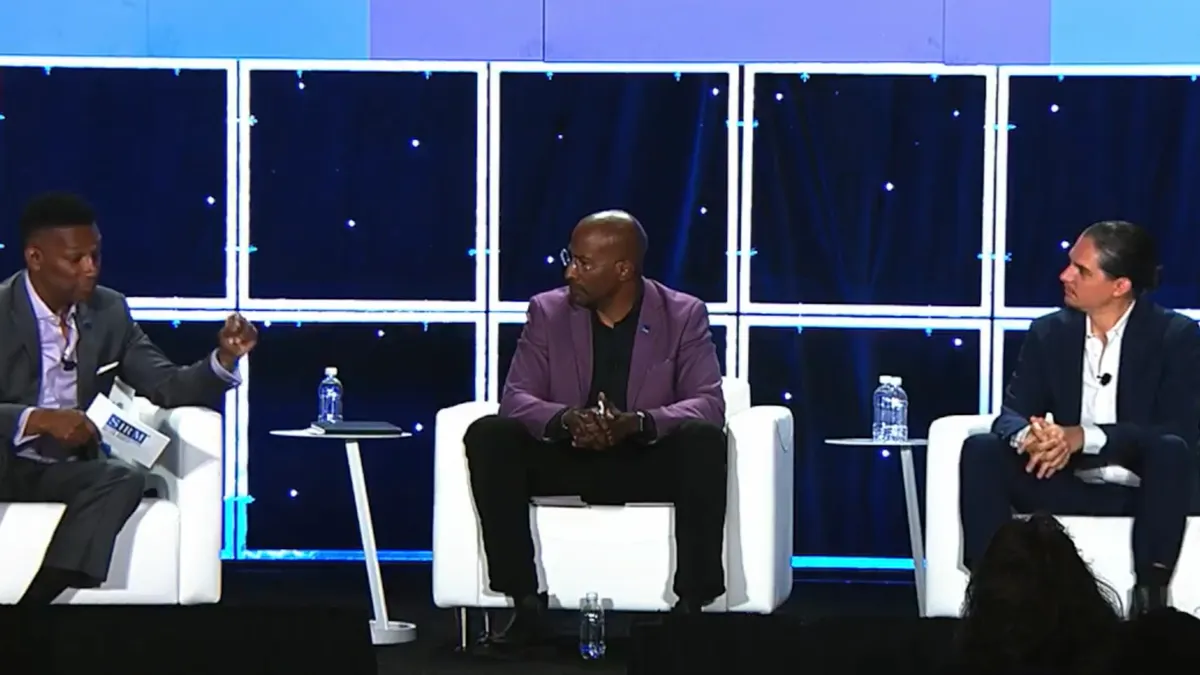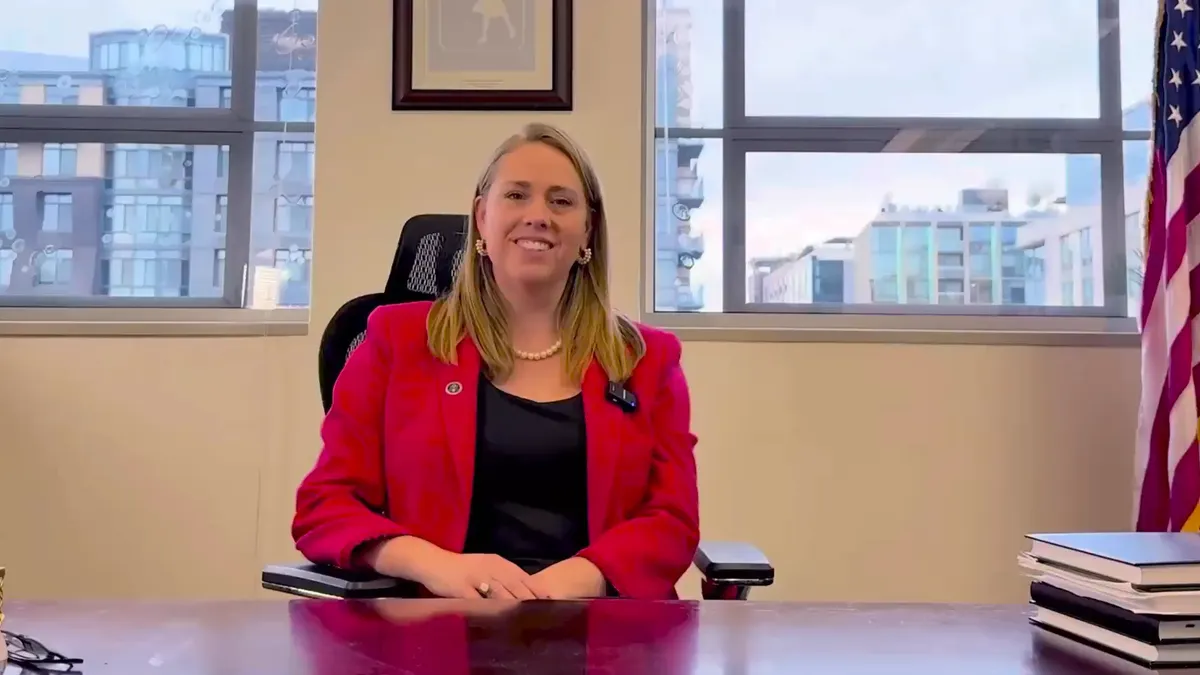Discuss the undiscussable. Curiosity over judgment. Practice civility.
These were the three edicts SHRM President and CEO Johnny C. Taylor Jr. decreed at the SHRM Blueprint panel livestreamed via LinkedIn yesterday. The purpose of his statement was two-fold: Set ground rules on how he wanted Tuesday’s session showcasing two controversial speakers to proceed, and reiterate SHRM’s stance on DEI at work and where the organization will be going in the future.
Before interviewing panelists Robby Starbuck and Van Jones, Taylor talked about ideological polarization in the U.S.
“Even more sinister, though, is underlying this divide are messages like, ‘If you aren't with me, you're against me. I'm right, so that makes you wrong. You're not like me, so I don't like you, and I don't like people like you,’” Taylor said. “Friends, it shouldn't be this way — because when simply speaking what you believe becomes cause for hate, or worse, justification for violence, we've all lost as a society.”
He then quoted Ezra Klein’s words in the wake of Charlie Kirk’s death, shared during “The Ezra Klein Show.” Klein, a New York Times columnist, spoke about his piece penned after Kirk’s death. “You can actually detest some of what he said and did, yet still believe that he was there on that stage, practicing politics the right way — showing up to college campuses and inviting people who disagreed with him to talk with him,” Taylor said, quoting Klein.
“My friends, it's time to bring civil discourse back — to bring back civility, to walk the talk and truly embrace our diversity, real diversity, not just the diversity we're comfortable with,” Taylor said, emphasizing the importance of listening to understand and not just respond.
Civil discourse on civility
Starbuck and Jones then answered questions from Taylor and audience members, clarifying both their stances not only on DEI but also what they believed corporate America should look like going forward.
Early in the discussion, Taylor asked the panelists why they decided to come speak at the newly minted conference despite all the online backlash. (Taylor called the people online who were SHRM Blueprint detractors “thumb thugs.”)
“If I'm being completely honest, it was like any other day of the week for me,” Starbuck said. “There's always going to be a very vocal small group of people that are explicitly angry about speech happening.” He told the Louisville, Kentucky, audience he was present because if people “don't communicate where we're coming from, that's where people are able to demonize and invent things that are not true.”
Jones, responding to Taylor, said “I'm here because you asked me to be here, and I love you, and I'm getting to know my friend over here.”
Less tongue-in-cheek, he gave kudos to the people on the front lines of HR. “There are people in this room who see good people passed over every day for opportunities. It hurts you. You see somebody who, because they're a woman, because they're a person of color, because they're different, they're in a wheelchair, they're a veteran, they just couldn't quite break through,” he said. “And you spent a long time trying to figure out how to get that talent pool bigger, how to get some of the bias out, so the folks who you know could have a better shot.”
“Now the whole floor is falling out from under you, and people are calling you names, and they can seem like you are the bad folks. And I just wanted to honor you,” he added.
Driving home his point about civility, Taylor asked Jones and Starbuck to discuss times when they heard a viewpoint they agreed with from an unlikely source. Jones mentioned his show “Crossfire” with Newt Gingrich; Starbuck mentioned that former Secretary of State Hillary Clinton and former President Joe Biden were tougher on immigration than he remembers.
Conference-goers ask the tough questions
When Taylor opened up the conversation to questions from the audience, he hammered home the importance of civility again, saying SHRM leadership recommended against a Q&A portion of the session, but he insisted on doing it anyway.
The questions and comments were respectful for the most part, and Starbuck — calmly, almost placidly — insisted throughout the session that he was fine answering any question a conference-goer had “even if you’re a little upset with me.” Unlike Taylor and Jones, who both said they had to jet after the session, Starbuck said he would answer audience questions for as long as needed.
Despite a fair bit of ruckus about the speakers, their credentials and the implications of SHRM’s alignment with them leading up to the event, the reception on the day of seemed more positive, if not neutral.
An in-person conference-goer asked if the event would ever be called SHRM Inclusion again, referencing the name it went by until this year. The answer from Taylor wasn’t definitive, but most people in the virtual chat said they didn’t mind the new moniker, unlike some of the more outspoken HR pros on LinkedIn.
A Blueprint session ‘on brand’ for SHRM
Last year, speaking at SHRM’s annual conference, Taylor foretold a “polycrisis” for HR professionals, citing civility as one of the trouble areas, along with AI and America’s skills gap.
While most livestream watchers had complaints about every other point of the conversation, civility wasn’t one of them. Still, SHRM’s focus on the issue hasn’t been without reproach from some HR professionals.
Prior to Tuesday’s session, one SHRM-certified professional and member of the professional organization wrote an op-ed for HR Dive about her belief that SHRM lost its way on inclusion: “So when the largest HR membership organization in the world begins to distance itself from inclusion under the guise of ‘civility’ or ‘nonpartisanship,’ it sends a chilling message to those of us doing this work every day.”
In light of Taylor’s comments Tuesday about how he wants to continue these discussions after the conference wraps up, SHRM’s civility agenda may be here to stay.























